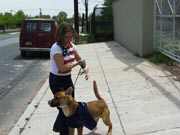As trucks rolled up to the new city-run animal shelter Wednesday with $30,000 in pet supplies, animal activists rejoiced at their latest efforts to raise capital.
Although the new Liberty Animal Shelter on 235 Jersey City Blvd. is far from complete, the groundwork for a fruitful partnership between city officials and animal organizations has resulted in grants, donations, and adopted animals. The supplies donated on Wednesday came from Hartz Mountain Corp., the Secaucus-based pet supplies company, in recognition of National Pet Week. Convincing them to make the donation, however, was the work of the Animal Shelter Coalition, a mix of different Hudson County animal activist groups that have joined forces to make the city’s newest shelter animal-friendly.
“[Hartz Mountain] assured us it’s the beginning of a long relationship with the Jersey City Animal Shelter,” said Tracey Mollis, a spokesperson for the Animal Shelter Coalition.
The donation is just one of the things that the coalition has acquired in an effort to ameliorate the conditions of the shelter. After gaining a $25,000 Geraldine K. Dodge grant, the animal shelter coalition has gotten the city to agree to use $10,000 from the grant to restore the second floor of the shelter. City officials said that the Department of Public Works plans to renovate the second floor to accommodate office space for the animal control officers and free up space on the first floor for more cages, a cattery and a more expansive “sick room.” To keep the animals as disease-free as possible, the coalition has gotten vaccines donated, too.
The need for a secondary animal shelter in Jersey City became evident when the Hudson County SPCA, also known as the Assisi Center, became overcrowded and was not able to accept many of the pets brought to it. The coalition petitioned Jersey City’s City Council to correct the problem of stray animals, and the city responded by turning an abandoned two-story building into an animal shelter.
Since its grand opening on Feb. 11, the coalition and the city have worked hand in hand to protect the stray animals in the city and find them homes.
“Our non-profit organizations are regularly in a coalition to provide the amenities that the city can’t provide,” said Norrice Raymaker, president of the Liberty Humane Society.
Aside from raising funds, the coalition actively seeks volunteers to assist in the maintenance duties at the shelter. From cleaning the cages to taking dogs out for a stroll, the shelter is in need of helping hands, Mollis said. Orientation for new volunteers takes place on the first Sunday of every month at the shelter. Anyone interested in volunteering should call Mollis at (201) 239-9254 or e-mail libertyanimalshelter@yahoo.com.
To be sure, the shelter has little paid help, as there are only two full-time employees available to oversee the facility in addition to catching stray animals. One of those two animal control officers is solely responsible for picking up dead animals throughout the city. Coalition members said that the low manpower has caused a huge vacuum in the shelter.
Joe Frank, the chief animal control officer, said he picks up anywhere from 6 to 15 animals a day. Some are strays and some have strayed from their owner. Fortunately, Frank said, many owners have managed to recover their animals at the new shelter.
Aiming for a no-kill shelter
By law, the city-run shelter has to have animals euthanized if can not accommodate new stray animals from entering. The general rule of thumb is that the animals need to be taken away after seven days. However, Coalition members said that Frank has tried to save as many animals as possible.
“Joe is great at extending the deadline,” Mollis said.
According to Raymaker, the coalition has developed relationships with privately run shelters outside the city that can take in animals that are “adoptable.” Diseased animals, old animals, and pit bull terriers are often rejected by these places, though. As a result, the Liberty Animal Shelter winds up housing these more costly animals.
In the future, Raymaker said, the coalition hopes to encourage the city to develop a comprehensive spay/neutering program, educate the public about animal control, and thereby effectively cutting down the number of animals brought into the shelter. Through this method, Raymaker said, the coalition will reduce the need to euthanize animals.
The other shelter across town, the SPCA Assisi Center, was changed to a no-kill shelter two years ago, but this past winter, its former director was terminated. A new board said it would go back to euthanizing animals. New director Stanley Rotopel did not return phone calls last week for an update.
